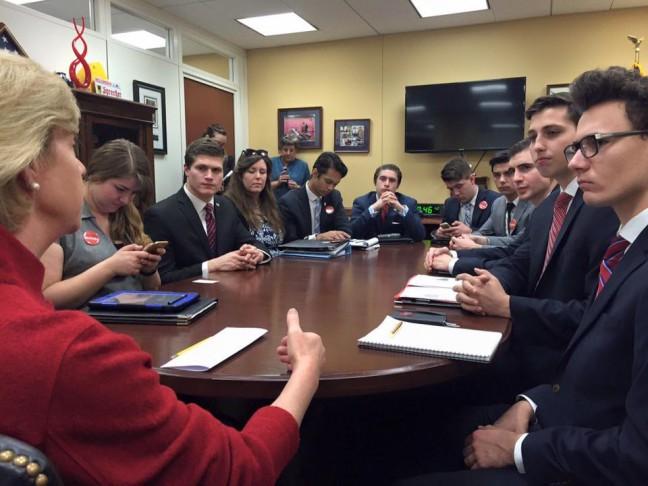Gov. Scott Walker’s office is looking for new applicants to serve on the University of Wisconsin System Board of Regents to represent students. UW, however, is not on the list of eligible applicants.
Students in the UW System actively engage in shared governance, and are seeking to make more student voices heard during the system’s decision-making process.
Walker is seeking applicants to represent nontraditional students in the UW System as the student regent, according to his official website. The selected applicant will serve for two years. But since the current regent is from UW, applicants from the Madison institution will not be accepted.
Nicolas Harsy, the current student regent on the board, is a computer science student at UW. Walker appointed him in May 2014 to represent non-traditional students on the UW System Board of Regents.
Nontraditional students represent full-time college undergraduates who are 24 years or older because they did not follow the traditional academic path, Harsy said. Harsy himself attended UW for two years before dropping out and joining the marines, where he served for five years.
“When I came back to school, I wanted to continue [to make a difference], I wanted to make sure that this school will be in better shape than when I started,” Harsy said.
During his time on the Board of Regents, Harsy said he spent at least six months figuring out how things work. He fully immersed himself in the voluminous materials and resources, visited different campuses and talked to many people to maximize his experience as a representative for students.
The biggest challenge, however, was not the amount of new information, but the dual identity as a student and a decision-maker, Harsy said.
“As a student I do need to voice the concerns of the students, make sure that student opinions are being heard,” Harsy said. “But at the same time I do make sure that what’s best for the system and what’s best for every school in the system will get done.”
Being a Board of Regents student representative, however, is only one of the ways to communicate student concerns and make a difference in state government.
The UW System Student Representatives is a student-led, cross-campus organization, discusses issues in the system with lawmakers to make sure student voices are heard at the state level.
According to the UW System Student Representatives website, the organization formed in October 2013, after UW System student government presidents gathered in 2012 to adopt the UW System Student Representatives Constitution, building a more effective statewide association to represent student opinions.
The group coordinates monthly meetings with leaders from 26 UW System schools to make sure each one is on the same page regarding student affairs, the organization’s chair, Ryan Sorenson, said. He considers UW Student Representatives the middleman between campus governance groups and the state government.
“We each meet once a month, correspond with each other, network, talk about big ideas and how we can help shape and develop student interest on our campus,” Sorenson said.
Harsy said being a good representative for student interest is difficult, but he also learned a lot during the process.
“It takes a lot of effort, and it takes a lot of maturity,” Harsy said. “The more time you put into it, the more people you talk to, the rewards increase exponentially.”
Besides maturity, it also takes energy and empathy to be good student representatives, Sorenson said, because they often need to deal with system and government bureaucracies that can let them down easily.
In those times, Sorenson said, no matter if it’s the budget cut or shared governance issues, student leaders need to push themselves forward and not be defeated.
“You just got to get back up to keep fighting, keep representing students,” Sorenson said. “Because at the end of the day that’s what our job is, to represent students, to ensure that students’ best interests are heard.”


